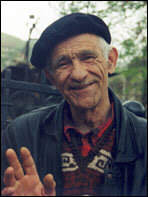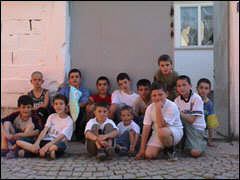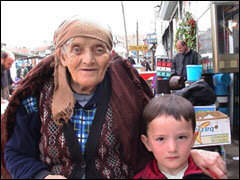 LANGUAGE LANGUAGE |

Kosovar Albanian Man
Albanian is an Indo-European language spoken by about 6,400,000 inhabitants of the eastern Adriatic coast in Albania and neighbouring country's principally in Kosovo and Macedonia. There are also approximately 300,000 more speakers in isolated villages in southern Italy (Abruzzi, Molise, Basilicata, Puglia, and Calabria), as well as Sicily, and southern Greece (Voiot'a, Attica, ƒvvoia, çndros, and the Pelop-nnesos)
Albanian Language has two principal dialects, Gheg in the north and Tosk in the south, regions which are separated roughly by the Shkumbin River. Therefore the Gheg dialect is spoken in northern Albania, Kosovo, southern Serbia, Montenegro, Macedonia, and in the Croatian coast of Dalmatia. While the Tosk dialect is spoken in southern Albania, and in enclaves in Italy, Greece, Bulgaria, Turkey and the Ukraine.

Local school children Prishtina
The official language is written in the standard roman-style orthography adopted in 1909. Until World War II the spelling was primarily based on the southern Gheg dialect of Elbasan, but since the war it has been modelled on Tosk. Albanian speakers in Kosovo and in Macedonia used the eastern varieties of Gheg but since 1974 a common orthography with Albania has been widely adopted. Before 1909, the little preserved Albanian literature available was written in local Italianate or Hellenizing orthographies, and even in Turko-Arabic characters.
Albanian shows no obvious affinity to any other Indo-European language; it is simply the sole modern survivor of its own subgroup. Of ancient languages, Dacian (or Daco-Mysian) and Illyrian have been tentatively considered its ancestor or nearest relative.

The young and the old
In general terms, Albanian grammar and other formal
peculiarities are reminiscent of Modern Greek and
other Romance languages, especially Romanian. Phonetically
it suggest Hungarian or Greek, but Gheg´s
nasal vowels strikes the ear as distinctive. Although
Albanian has a host of borrowed words from its neighbours,
it shows very few evidences of contact with ancient
Greek. Obviously close contact with the Romans gave
many Latin loans. Furthermore, such "loanwords"
in Albanian attest to the similarities in development
of the Latin spoken in the Balkans and of Romanian,
a Balkan Romance tongue. For example, the Latin
word paludem (swamp) became padulem, and then padure
in Romanian and pyll in Albanian, and both have
a modified meaning (forest.) |
Conversely, Romanian also shares some apparently non-Latin indigenous terms with Albanian; e.g., Romanian (brad) Albanian (bredh) "fir." Therefore these two languages reflect special historical contacts of an early date. Early communication with the Goths presumably contributed to tirq, meaning "trousers, breeches" (from an old compound "thigh-breech"), while early Slavic contacts gave gozhd' "nail." Many Italian, Turkish, Modern Greek, Serbian, and Macedonian-Slav loans which can be attributed to cultural contacts over the past 500 years with Venetians, Ottomans, Greeks (to the south), and Slavs (to the east).
 LANGUAGE: ALPHABET LANGUAGE: ALPHABET |
The Albanian alphabet consists of 36 letters of the Latin script. The alphabet was standardised in 1909.
A B C Ç D Dh E Ë F G Gj H I J K L Ll M N Nj O P Q R Rr S Sh T Th U V X Xh Y Z Zh
a b c ç d dh e ë f g gj h i j k l ll m n nj o p q r rr s sh t th u v x xh y z zh
 PRONOUNCIATION PRONOUNCIATION |

a as a in father b as b in Boston c as ts in curtsy ç as ch in church d as d in Denver dh as th in they e as e in set ë as e in term f as f in free g as hard g in go gj as dg in dodge h as h in her i as i in machine j as y in year k as k in king l as liquid l in alien ll as ll in all m as m in man n as n in now nj as ni in union o as o in oak p as p in pencil q as ch in chair r as r in roar rr as highly trilled rr in Spanish burro s as s in see sh as sh in she t as t in two th as th in three u as oo in loom v as v in value x as dz in adze xh as j in jester y as Ÿ in German Fÿhrer or u in French du, murz as z in zone zh as si in vision
 SOME USEFUL PHRASES SOME USEFUL PHRASES |
Hello Tungjatjeta
Goodbye Mirupafshim
Please Ju lutem
Thank you Faleminderit
Good Morning Mirëmëngjes
Good Afternoon Mirëdita
Good Night Mirëmbrëma
Yes Po
No Jo
Do you speak English? A flisni anglisht?
I do not understand Albanian Unë nuk kuptoj shaqip
How much does it cost? Sa kushton? |

